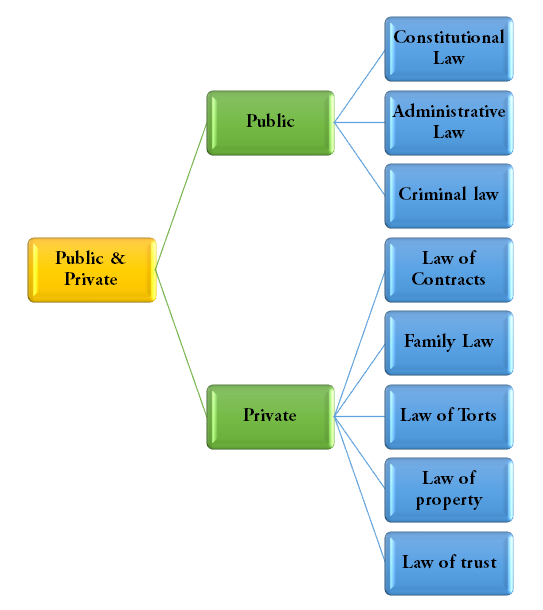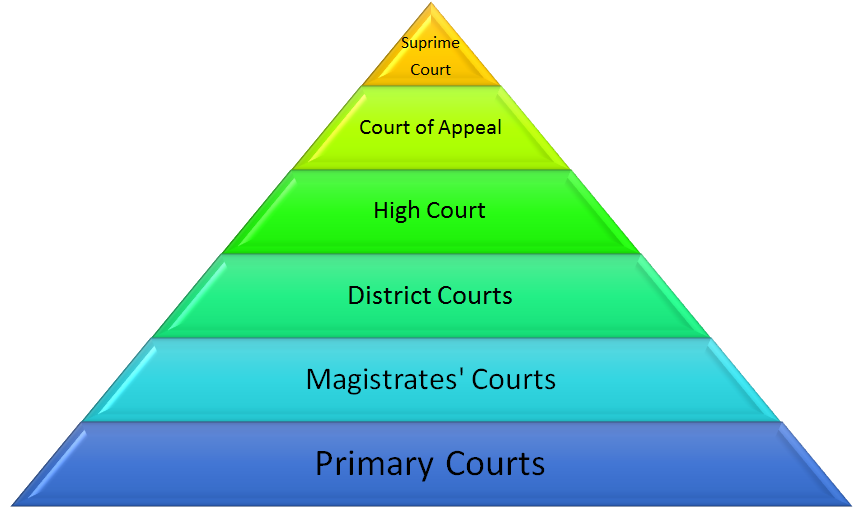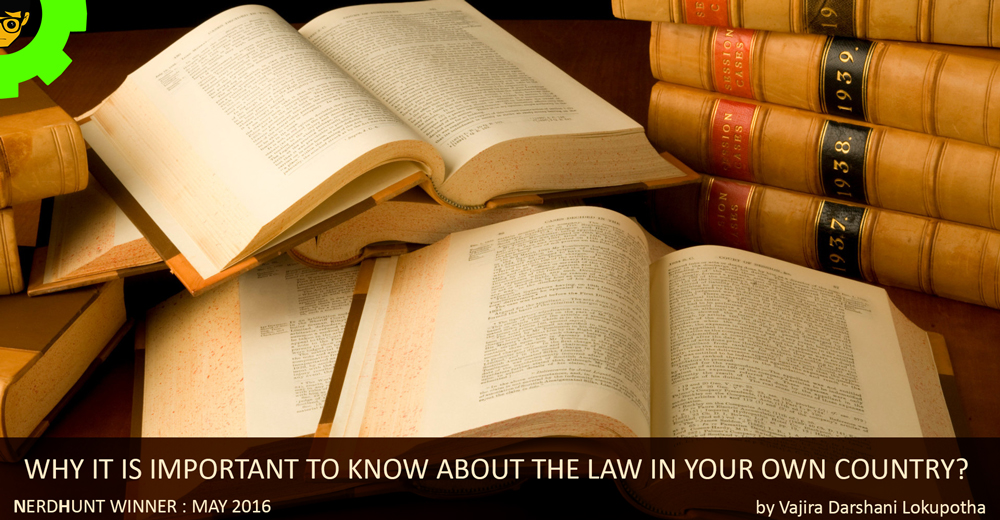“Law” does not operate in a vacuum and it has no life independent of the human society where it functions. When it operates in the society, it affects every aspect of our life. It governs our conduct from the cradle to the grave and sometimes even after the death. That’s why it is useful to civil people to know about the general law, of his/her own country and then internationally. The most important point of this is, you will be never apologized by a court if you have done any particular offence, without the knowledge of the law.
Human societies are highly complex social structures. Without a social order or a system of rules or codes of conduct to control them, such societies would find it difficult to maintain the society and they would gradually break up. Thus it can be said that the social order is a pre-condition for every society. It can be shown by many examples to show that man acts according to a social order from the dawn of human civilization. In that social order, legal order is one element and it has the following basic functions.
- Keep the peace
- Enforce standards and to maintain order
- Facilitate planning
- Promote social justice
Thus the legal order controls the behaviour pattern among individuals themselves and between individuals of themselves and between individuals and the society. Therefore, as it can be said that human relations are the subject matter of legal order, it is fair to define the law as follows.
“Law is a set of principles, rules and standards of conduct that have general application in the society.”
However, the effort to define law has been an endless experience of philosophers from the dawn of legal history. It is somewhat like the fable of blind man and elephant. Even though their view was correct according to their feeling, it is not correct as a whole. So, all of those perceptions are at least partially accurate but do not depict the real picture of law, where we observe the above idea in defining law in general.
Now, let us first see what the classifications of law are. Certainly, there are many ways to classify the law. They are as follows.

In Public Law, it is concerned with the relationship between the state and its citizens. Private Law is preliminarily concerned with the rights and duties of individuals towards each other. Private Law is also called Civil Law.

Secondly, the law can be generally divided into Criminal Law and Civil Law based on the fundamental differences in the purpose, procedure and terminology. Criminal Law is concerned with forbidding certain forms of wrongful conduct and punishing those who engage in those prohibited acts.
Civil Law deals with the private rights and obligations which arise among individuals. The purpose of this is to remedy the person who has suffered by the breach of the civil law claimed. The distinction between Criminal and Civil Law does not depend on the nature of the wrongful act since the same act may give rise to both of them. For example, we can take a motor accident. So, let us see some of the differences in between Criminal and Civil Law.
Information source: LWU1161 © 2001 Open University of Sri Lanka
According to the third classification, Substantive Law deals with the substance of the law. It means it sets out the rights and duties governing the people as they act in the society. It declares the applicability of different fields of law. Procedural Law establishes the rules under which the substantive laws are enforced. It shows the way of obtaining rights or way to discharge the obligations under the Substantive Law.
After having general knowledge of the law, secondly, we may talk about another major part of common applications of the law. That is, it would be much easier for you if you know to which court that you must produce your case according to the relevant particular matter that you care about in your problem. To do it with no issues it is important to have a general knowledge about the court system of your own country. In here I would like to talk about the court system of Sri Lanka specially.
The courts are entrusted with the task administration of justice. In particular matters, the aggrieved party can sue the wrong doer in civil matters. But the government will take necessary steps to institute a case against the wrong doer where there is a breach of the Criminal law.
Provisions relating to Courts system can be found in the Constitution of Sri Lanka as well as the Judicature act No. 2 of 1978. According to article 105 of the Constitution the Court of Sri Lanka are:
- The Supreme Court of Sri Lanka
- The Court of Appeal of Sri Lanka
- The High Court of Sri Lanka
The judicature act has established the following courts for the first instance:
- District Court
- Magistrates’ Courts
- Primary Court
Every court has its own power to administer justice and a court may decide a case which is brought to the proper court. This is because a particular court can only here a case over which it has jurisdiction. The jurisdiction is the authority of a court to hear and determine the case brought before it. It is therefore the understanding about the jurisdictions of different courts will help you to go to the correct court when there is a wrong done to you.
If we make a chart according to the jurisdiction of different Courts in Sri Lanka, it can be shown as follows.

Let us simply talk about the jurisdictions with regards of several courts.
Supreme Court of Sri Lanka
Supreme Court is the highest and final court in Sri Lanka. It has jurisdictions with regarding several matters as follows.
- Constitutional Jurisdictions
- Fundamental Rights Jurisdictions
- Consultative Jurisdictions
- Jurisdictions with regard to Election Petitions
- Final Appellate Jurisdictions
- Jurisdictions relating to Parliamentary Privileges
- Rule Making power
The Court of Appeal
The Court of Appeal has appellate jurisdiction for the correction of all errors: fact or in law committed by any High Court, District Court, Primary Court or tribunals or other institutions. As the same, it has the writ jurisdiction, several writs can be issued by this court. They are:
- Certiorari
- Prohibition and Procedendo
- Mandamus
- Habeas corpus
- Quo warranto
The High Court
High Court has original criminal jurisdiction. According to the 13th Amendment to the Constitution Provincial High Court has appellate or reversionary jurisdiction in respect of convictions, sentences and orders entered or imposed by the Magistrates’ Courts and Primary Courts within the province. It has jurisdiction to
- Issue Certiorari, Prohibition and Procedendo, Mandamus, Habeas corpus and Quo warranto writs.
- Jurisdiction in respect of all prosecution on indictment
- Jurisdiction to try offences of piracy committed by any person on the high seas or any offences committed by any person on the high seas or any offences committed by the Sri Lankan citizens anywhere outside Sri Lanka.
District Court
District Court has unlimited original jurisdiction regarding the following:
- In the civil matters
- Revenue matters
- Regarding trusts
- Regarding insolvency
- Testamentary matters
Likewise, District Court has jurisdiction over the following matters too.
- Jurisdiction over the persons and estates of persons of unsound mind and appointment of guardians
- Care and custody of the persons and estates of all idiots and persons of unsound of mind
- Appoints administrators regarding testamentary actions
- Functions of Family Courts
Magistrates’ Court
Magistrates’ Court is the criminal court of the instance. When a serious offence is committed by a person, Magistrates’ Court hears the case summarily and if there is sufficient evidence, the case will be committed to the High Court while petty criminal offences are referred to the Primary Court.
The following offences are under the jurisdiction of Magistrates’ Courts.
- Offences relating to Navy, Army and Air Force
- Offences against public tranquillity
- Offences by or relating to public servants
- Offences relating to public justice
- Jurisdiction to inquire into cases sudden or accidental death
Primary Court
Primary Court has special jurisdiction in relation to disputes which may lead to breach of the peace and has original civil jurisdiction regarding
- Debts
- Damages
- Demands
- Claims which does not exceed one thousand five hundred rupees
- Jurisdiction in relation to the enforcement of by laws of local authorities
By this simple introduction, it is expected to give a general knowledge of the governing law and its structure in Sri Lanka, illustrating why it is so important to a citizen of knowing these matters. Actually, it is so important to have an understanding about the relationship between law and society with its classifications comparisons and contrasts as well as the powers of courts, even to a civil person in his/her day to day life. If the whole society would get such knowledge, the society can be a better and more beautiful place where each and every person can live with peace, happiness and security without any conflicts.
Vajira’s ideas
I’m Vajira Darshani Lokupotha who is working as an apprentice of Law after 3 years academic period at the Sri Lanka Law College. Previously I have completed my studies in the Open University of Sri Lanka in Bachelor of Science. I really like writing but I have a busy academic life and self-employed work. Fortunately, I got to know about Nerdynaut from one of my friends and it made me interested in writing something to the society worthwhile. So, I decided in writing about some Law aspects since I felt that it would be better for everyone as each and every citizen has their own duty to know about Law in their day to day life. I really appreciate the effort that Nerdynaut team is taking to uplift the writing skills of the young generation. It’s a good opportunity for everyone to share their knowledge internationally. I invite all of you to join Nerdynaut to experience the power of knowledge.
NerdHunt winner: May 2016
References
- http://www.srilankalaw.lk
- http://www.lawnet.lk
- Course material of LWU1161 – Open University of Sri Lanka

